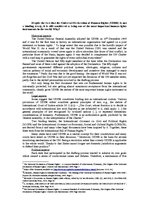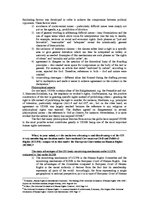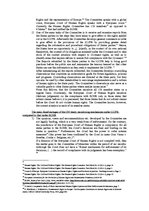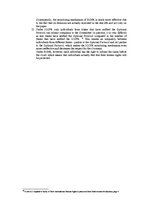-
Essay in Human Rights
The main disadvantages of the UN treaty monitoring mechanism under ICCPR compared to that under ECHR
1) The opinions, views and recommendations etc. developed by the Committee are not legally binding, which is a very weak form of enforcement. On the contrary, the jurisdiction of the European Court of Human Rights is compulsory for all states parties to the ECHR, the Court’s decisions are final and binding on the States in question. Furthermore, the Court has the power to order interim measures (this power has been confirmed by the Court in cases Cruz Varas v. Sweden, Conka v. Belgium, etc.) .
If a decision of the European Court of Human Rights is not complied with, then the matter goes to the Committee of Ministers within the period of six months. Although the Court does not have a “formal mechanism for enforcement of its decisions, (…) the record of compliance with its judgments has been exemplary.”
Consequently, the monitoring mechanism of ECHR is much more effective due to the fact that its decisions are actually executed in the real life and not only on the paper.
2) Under ICCPR only individuals from States that have ratified the Optional Protocol can submit complains to the Committee. In practice, it is very difficult as less States have ratified the Optional Protocol compared to the number of States that have ratified the ICCPR. This creates an inequality between individuals from different States - parties to the Optional Protocol and not parties to the Optional Protocol, which makes the ICCPR monitoring mechanism even more ineffective and decreases the respect for the Covenant.
…
An answer was given to the question: 1) Despite the fact that the Universal Declaration of Human Rights (UDHR) is not a binding treaty, it is still considered as being one of the most important human rights instruments in the world. Why? - from legal, political, psychological and historical point of view, and to the question: 2) What, to your mind, are the main two advantages and disadvantages of the UN treaty monitoring mechanism under International Covenant on Civil and Political Rights (ICCPR) compared to that under the European Convention on Human Rights (ECHR)?




